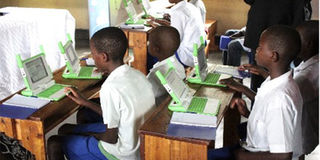We’ve seen Africa’s future, and it’s exciting — or maybe scary

Pupils at Kimisagara Primary School in Nyarugenge District in Rwanda use laptops. With the possibility of energy for so many many more people, it also becomes a platform for organising lives in new ways beyond the infrastructure provided by the State. PHOTO | FILE | NATION MEDIA GROUP
What you need to know:
With promising super-fast feeds and fast low-cost internet, we shall be able to broadcast to close-knit groups.
- The bishops will not approve of some of it, because you can broadcast live pornography, for example.
But you can teach a class, or broadcast a play, off your mobile device at virtually no cost.
Earlier in the year, Bloomberg reported the cost of solar panels will fall by 35 percent in 2018. Since 2010, the cost of solar photovoltaic (PV) electricity has fallen by 73 per cent.
Globally, China is the main driver of stumbling solar energy prices with Bloomberg noting that it installed a “staggering 52GW in 2017”. By contrast, Africa installs, on average, 1,000MW of new power generation yearly and, as far as renewables go, some projections have it doing just 3,000M by 2022 — 17 times less than China did last year.
RENEWABLES
That’s no reason to give in to despair, however. Recently, I listened to a smart African who knows about renewables talk about how, with stumbling solar prices, low generation and crappy distribution, which have left 600 million Africans still living without electricity, there is a big rush to invest in renewables on the continent — the market is massive.
I didn’t think beyond the availability of cheap electricity for Africans when I was listening to him, until two other events in recent days.
FACETIME
A week ago, it was reported that researchers at RMIT University in Australia had achieved a new development in fibre optics that could make internet speeds up to 100 times faster. Mind-boggling! And, on Tuesday, Apple, at its iPad and Mac event (AAPL), in New York, announced a software update to enable Group FaceTime for up to 32 participants — from two!
In five to eight years, I wondered, what would the impact of these technologies be in Africa?
SOLAR PANELS
Not too long ago, a group of us went to visit a friend deep in rural eastern Uganda over a Christmas holiday, to have lunch with his family and mum. He was living plonk in the 21st century but totally off-grid — he was mining his own water, generating power from solar and had pay TV in a house planted in the middle of rocks looking like the ones you see on the coast of Greece.
On the way to his place, we passed roadside markets where solar panels were being sold alongside beans, tomatoes, potatoes and live chicken. Grass-thatched houses gleamed with solar panels on their roofs, a feature that is spreading rapidly around Africa and, perhaps, more dramatically in Kenya.
STRANGE WIRE
Not too long ago, I was in the middle of what those who don’t know better would call dead-end Pokot — in a small town and surrounding villages where every house had solar and the owners used solar phones. Inside, a strange wire dangled in nearly all corners — for charging phones.
Solar in Africa, then, is not just about energy. With the possibility of energy for so many many more people who would have been off-grid at low cost, it also becomes a platform for organising lives in new ways beyond the infrastructure provided by the State.
DISRUPTIVE
And so, if we look just around the corner, where we have not only cheaper internet but several times faster internet and applications that allow 32 people — and, by then, possibly 100 — to join a conversation, then the “digital secession” we wrote of before will reach extremely disruptive levels.
You could hold a meeting of your family and all the in-laws live while eyeballing everyone. You could have a chama meeting with quorum on FaceTime. And you can connect all the relatives abroad who couldn’t travel for a dear uncle’s burial to the event on a device in your palm.
PORNOGRAPHY
Already, messaging apps such as WhatsApp have proved powerful platforms for everything from benign stuff like talking sports to potent and deadly endeavours like mobilising to win — and steal — elections, spreading hate speech, organising to finish off rivals and organising street action against a bad government.
With promising super-fast feeds and fast low-cost internet, we shall be able to broadcast to close-knit groups. The bishops will not approve of some of it, because you can broadcast live pornography, for example, although in very socially liberal contexts it will be a new revenue stream for some.
BROADCAST
But you can teach a class, or broadcast a play, off your mobile device at virtually no cost. It might also be good for democracy and human rights because you can get more people to see your live recording of police brutalising protesters and an official taking a bribe.
People will continue to watch national TV, but far fewer. There will be a shift of power. The president will get on fewer and fewer of the channels that broadcast “news”, driven by off-grid energy and everything else.
There will be new figures of authority, and allegiances away from the ‘Big Men’ — of business, State, Church, Mosque.
It will be a wonderful time to be alive.
Mr Onyango-Obbo is the publisher of Africapedia.com and explainer Roguechiefs.com. @cobbo3





